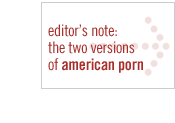

Editor's Note: This page was updated February 3, 2004.
It's one of the hottest industries in America. Easier to order at home than a
pizza, bigger than rock music, it's arguably the most profitable enterprise in
cyberspace. AT&T has been in the business. Yahoo! has profited from it.
Westin and Marriott have made more money selling it than selling snacks and drinks
in their mini-bars. And with estimates as high as $10 billion a year, it
boasts the kind of earnings that most American businesses would envy.
It's pornography. And with adult movies, magazines, retail stores, and the
growth of the Internet, business is booming. But the leaders of the adult
entertainment industry are worried. They viewed the election of George W. Bush
and his appointment of Attorney General John Ashcroft as a signal that there
is renewed interest in mounting obscenity prosecutions.
In "American Porn," FRONTLINE reports on the forces behind the explosion
of sexually explicit material available in American society. Through
interviews with adult entertainment executives and lawyers, porn
producers and directors, federal and state prosecutors, anti-porn activists and a
Wall Street analyst covering the entertainment industry, the program examines
the business ties between respected corporations and porn companies, the rise
of extreme hardcore porn, and the pending political battle that may soon engulf
the multibillion-dollar pornography industry.
"American Porn" begins with an inside look at some of today's most successful
pornography businesses -- from Larry Flynt Publications to the
popular Internet site Danni's Hard Drive -- to see how their profits have
exploded in the past few years. According to Flynt, his company -- a conglomerate of movies, strip clubs, sex emporiums (including
the upscale Hustler Hollywood), and Internet sites -- is worth $400
million. Danni's Hard Drive proprietor Danni Ashe, a former exotic dancer turned dot-com millionaire and CEO, told FRONTLINE she expected to earn $8
million last year alone.
While most Americans decry the avalanche of sexually explicit material, the
profits speak for themselves. FRONTLINE explores the range of pornography now
available -- from soft porn "couples" entertainment to the most extreme of
hardcore pornography -- and why large numbers of Americans are finding something
alluring in the adult entertainment arena. Both Flynt and Ashe credit the
1990s explosion of adult material to the ease of viewing and ordering porn from
the Internet. Equally important, they say, was the Clinton administration's
relaxed attitude toward pornography. Some former Justice Department officials
say that corporate America felt it was safe to enter the profitable porn
market.
"Companies like AT&T bought up a cable company, signed contracts with the
Hot Network, which is a hardcore pornographic site," says Patrick Trueman,
former head of the Justice Department's obscenity section in the Reagan and
Bush administrations. Trueman now represents the American Family Association, a
nonprofit organization promoting traditional family values.
"Other mainstream companies thought, 'We can do this, too,'" he says. "And
why not? There's a big market and no penalty."
Times are changing, however, and "American Porn" chronicles not only how porn
has been prosecuted in the past -- but how it may soon be prosecuted again. With George W. Bush
as president, porn moguls are nervous. In an attempt to head off a government
crackdown, the top adult entertainment executives have created a list of
21 pornography no-no's. Dubbed the "Cambria List" after First Amendment attorney and porn industry defense counsel Paul Cambria, who was involved in the list's preparation, it warns porn producers against showing such acts as bestiality, urination, and facial ejaculation.
Some in the industry, such as Extreme Assocites producer Robert Zicari (known as "Rob Black" in the business), insist
they will continue to test the limits despite the Cambria List. Zicari will get his chance.
As of February 2004, he and his wife, Janet Romano, are awaiting trial on federal obscenity charges.
It's the first time in more than a decade the federal government has filed such charges.
Other pornography producers are concerned that the very pioneers of the business are
selling out in order to appear mainstream.
"It's a bunch of rich guys running scared," producer Mark Cromer tells
FRONTLINE. "It's a bunch of guys who were, maybe, rebels in the 1970s and
1980s and don't want to fight anymore. They want to take their chips out of
the bank and cash them in and go home and play golf."
But big pornographers aren't the only ones concerned. This FRONTLINE report
looks at how mainstream companies have become wary as well. Yahoo!, for
example, withdrew its bid to open a virtual sex shop following an anti-porn
campaign waged by the American Family Association.
Will the big distributors of pornography -- such as cable and satellite
operators -- also be affected by a government crackdown? Until now, companies
such as AT&T have argued that they are like the postal service -- delivering
material that people want and have ordered. They claim that they are meeting a popular
demand and see nothing illegal or wrong in what they are doing. But will the
U.S. Supreme Court arrive at new standards for obscenity that
could challenge these assumptions?

home . introduction . prosecuting . the business . special reports
watch the program . if you were the juror... . quiz . do you use porn? . discussion
interviews . readings & links . tapes & transcripts . press reaction . credits . privacy
FRONTLINE . wgbh . pbs online
some photos copyright © 2002 photodisc all rights reserved.
web site copyright WGBH educational foundation
|